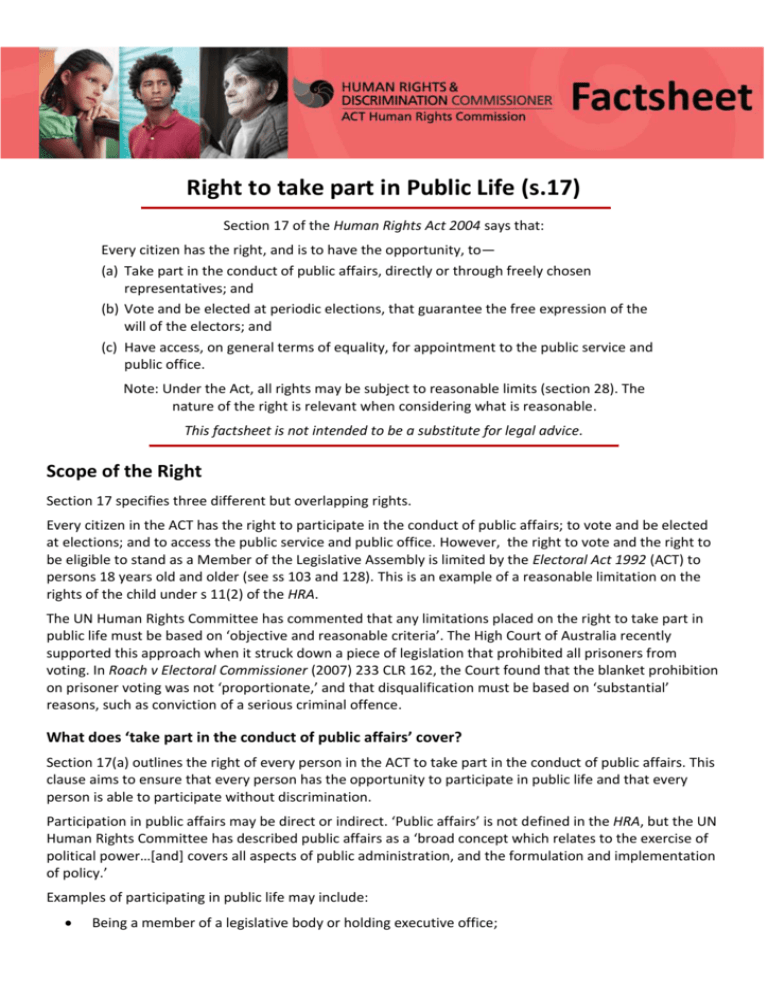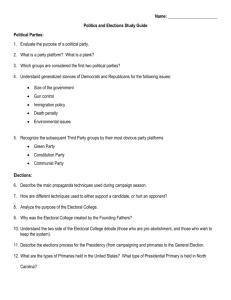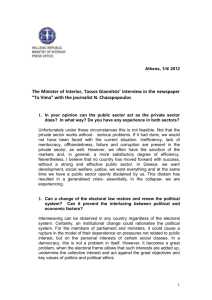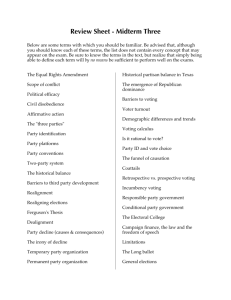doc
advertisement

Right to take part in Public Life (s.17) Section 17 of the Human Rights Act 2004 says that: Every citizen has the right, and is to have the opportunity, to— (a) Take part in the conduct of public affairs, directly or through freely chosen representatives; and (b) Vote and be elected at periodic elections, that guarantee the free expression of the will of the electors; and (c) Have access, on general terms of equality, for appointment to the public service and public office. Note: Under the Act, all rights may be subject to reasonable limits (section 28). The nature of the right is relevant when considering what is reasonable. This factsheet is not intended to be a substitute for legal advice. Scope of the Right Section 17 specifies three different but overlapping rights. Every citizen in the ACT has the right to participate in the conduct of public affairs; to vote and be elected at elections; and to access the public service and public office. However, the right to vote and the right to be eligible to stand as a Member of the Legislative Assembly is limited by the Electoral Act 1992 (ACT) to persons 18 years old and older (see ss 103 and 128). This is an example of a reasonable limitation on the rights of the child under s 11(2) of the HRA. The UN Human Rights Committee has commented that any limitations placed on the right to take part in public life must be based on ‘objective and reasonable criteria’. The High Court of Australia recently supported this approach when it struck down a piece of legislation that prohibited all prisoners from voting. In Roach v Electoral Commissioner (2007) 233 CLR 162, the Court found that the blanket prohibition on prisoner voting was not ‘proportionate,’ and that disqualification must be based on ‘substantial’ reasons, such as conviction of a serious criminal offence. What does ‘take part in the conduct of public affairs’ cover? Section 17(a) outlines the right of every person in the ACT to take part in the conduct of public affairs. This clause aims to ensure that every person has the opportunity to participate in public life and that every person is able to participate without discrimination. Participation in public affairs may be direct or indirect. ‘Public affairs’ is not defined in the HRA, but the UN Human Rights Committee has described public affairs as a ‘broad concept which relates to the exercise of political power…[and] covers all aspects of public administration, and the formulation and implementation of policy.’ Examples of participating in public life may include: Being a member of a legislative body or holding executive office; Deciding on public issues through referendum or other electoral processes; Taking part in popular assemblies to make decisions about local issues; Being part of a community consultation with government; Being able to attend and ask questions at a local council meeting; Participating in public debate and dialogue with representatives (either as an individual or as part of an organisation). Note: Participation in ‘public life’ means participation in the political affairs and public administration of the Territory. The word ‘public’ life in this context does not mean ‘community’ life or ‘social’ life. Participation in one’s community may engage other rights under the Charter such as the right to freedom of movement (section 13) or equality rights (section 8). The right to take part in public life does not mean the right to access public space through the use of public transport. Example: No right of access to information or documents – Law Society of the ACT & Treasury Directorate and NRMA Insurance (Appeal) [2013] ACAT 36 (21 May 2013) In this matter, the Law Society of the ACT made a request to the Treasurey Directorate under the Freedom of Information Act 1989 (ACT) for information to enable them to respond to an exposure draft document proposing changes to compulsory third party motor vehicle insurance. Ten documents were not released on the grounds that they were exempt. At first instance ACAT held that five of these documents should have been released, but that the other five should remain exempt. The Law Society appealed that decision. The Tribunal dismissed the appeal holding that s 17 generally, and s 17(a) in particular, does not necessarily contemplate a right to access information or documents. Examples of when this right could be relevant in practice The actions of public authorities can both promote and limit rights. Section 17 could be engaged by activities that: Limit the ability to take part in municipal and parliamentary elections; Require individuals to meet certain conditions in order to be eligible to participate in municipal and parliamentary elections; Regulate how individuals vote in elections (for example, the method of voting); Regulate eligibility and access to employment in the public service or appointment to public office; Establish requirements for membership of public bodies; Regulate the conduct of elections and the electoral process; Regulate the suspension and conduct of local government; Regulate the suspension and removal of statutory office holders; Regulate electoral processes including funding of and expenditure by political parties and the drawing of electoral boundaries; Affect communication of information and ideas about public and political issues . PH: (02) 6205 2222 TTY: (02) 6205 1666 WEB: www.hrc.act.gov.au EMAIL: human.rights@act.gov.au







